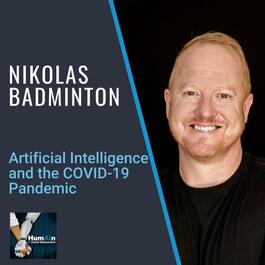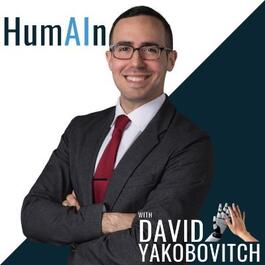
Artificial Intelligence and the COVID-19 Pandemic with Nikolas Badminton
[Audio] Podcast: Play in new window | Download Subscribe: Google Podcasts | Spotify | Stitcher | TuneIn | RSS Nikolas Badminton is the Chief Futurist at Futurist.com. He’s a world-renowned futurist keynote speaker, consultant, author, media producer, and executive advisor that has spoken to, and worked with, over 300 of the world’s most impactful organizations and governments. He helps shape the visions that shape impactful organizations, trillion-dollar companies, progressive governments, and 200+ billion dollar investment funds. Episode Links: Nikolas Badminton’s' LinkedIn: https://www.linkedin.com/in/futuristnikolasbadminton/ Nikolas Badminton’s Twitter: @NikolasFuturist Nikolas Badminton’s Website: https://nikolasbadminton.com/ Podcast Details: Podcast website: https://www.humainpodcast.com Apple Podcasts: https://podcasts.apple.com/us/podcast/humain-podcast-artificial-intelligence-data-science/id1452117009 Spotify: https://open.spotify.com/show/6tXysq5TzHXvttWtJhmRpS RSS: https://feeds.redcircle.com/99113f24-2bd1-4332-8cd0-32e0556c8bc9 YouTube Full Episodes: https://www.youtube.com/channel/UCxvclFvpPvFM9_RxcNg1rag YouTube Clips: https://www.youtube.com/channel/UCxvclFvpPvFM9_RxcNg1rag/videos Support and Social Media: – Check out the sponsors above, it’s the best way to support this podcast – Support on Patreon: https://www.patreon.com/humain/creators – Twitter: https://twitter.com/dyakobovitch – Instagram: https://www.instagram.com/humainpodcast/ – LinkedIn: https://www.linkedin.com/in/davidyakobovitch/ – Facebook: https://www.facebook.com/HumainPodcast/ – HumAIn Website Articles: https://www.humainpodcast.com/blog/ Outline: Here’s the timestamps for the episode: (00:00) – Introduction (01:37) – about the age of 10, I started programming computers and I flunked out of school. I eventually ended up in a program called Applied Psychology and computing at Bournemouth University. I got a Bachelor of Science in that degree. I also went into linguistics and artificial intelligence and using artificial intelligence to do a grammar checking and grammatical investigations. Then I dropped into the data world, massive data infrastructures using analytics, behavioral targeting of customers using data, then I started to be hired to speak about artificial intelligence, and we really got into talking about the human ethics and the hybridity of humans and the machines. (05:04) – Something that can act as a human, move as a human, perceives, creates its own philosophy, creates some purpose… we are a long way from that. I questioned people that are trying to give that to machines. We can't work out what it truly means for ourselves beyond a metaphysical and a discussionary, a philosophical bent. (06:59) – This is about humans. This is ultimately about a hybridity between humans and technology. They're not robotics that are independent from who we are, that are suddenly trying to take over the world. There's actual practical applications that are going to help us solve big problems. (09:19) – Artificial intelligence just doesn't wander off and becomes useful. It needs a lot of training. It needs a lot of guidance and a lot of that practical expertise. It might be able to start identifying patterns that we may not see as readily or as easy as AI, but our practical wisdom needs to be injected into the overall solution. (12:06) – COVID is a black elephant. The elephant in the room and the black swan. If you've got a black elephant, it's that black swan that's been in the room for over a hundred years that everyone knows, that there's a risk of it out rearing its head and causing a huge calamity, but we've just conveniently pushed it to the side and decided that the likelihood of that happening is a lot lower than we really want to pay attention to. (15:44) – If you've had that level of a focus and investment in artificial intelligence, in weapons systems, imagine if that reality of Skynet becoming Sentient becomes an actual reality. And maybe it's seeding the black elephant with some really heinous code or training that's been done by someone that's got a grudge. (17:18) – Using machine learning and data and analytics to make predictions using other practical solutions or a way from the normal ideas of technology. Climate change is the best example of a black elephant in the room. (23:55) – In America, culture is freedom. And anytime you tell me that you're taking my freedom away, I'm going to say, well, you know what? screw that. And that's the mess that America's got itself into. Singapore is very small. It can be contained and they've got ironclad rules around that. America's very big. And the idea of freedom isn't a bad idea. And democracy isn't a bad idea. This virus doesn't care about democracy. It doesn't care about freedom. It doesn't even care to infect humans. It just does it. (26:42) – This is going to go far and wide. It's our response to it, our ability to treat the virus, our ability to have healthcare that can help people that have it get over it in the more extreme cases, for us to take things seriously and to stay at home. We can see cases for years of COVID-19. (30:05) – If you don't shake hands and you stand at distance, if you're in the same room as someone or in the same open space, you've still got those mirror neurons firing. You still got that attraction, whether they're friends or lovers or potentials in either of those cases. And that's a pretty good step towards keeping social cohesion. Humans love to be around others. They just like the sense of human touch. And obviously, we're going to get back to that world. (33:35) – World leaders are clamoring for hope. They're trying to calm everyone down that there is some light at the end of the tunnel. I'm hopeful that we're going to get that. There's very smart people in the world working together. Artificial Intelligence is playing its role. Analytics is playing, so big data and data science is playing as well. These practical uses of artificial intelligence are really why we're here and why we're talking about this in this podcast and beyond. (36:06) – We've got to remember who's behind these solutions as humans, and even with the best machine learning and data sets, it's humans that are shaping the future and we're going to continue to shape the future. (38:10) – This is not the absolute future of work. The absolute future of work is a fundamental reprogramming of how the industrial world works and gets out of the way for a true digital evolution of biology, communications, transportation, and energy. (41:51) – I don't mind the idea of robots. What I don't really like about the idea of robotics is that we're trying to get them to do things that are so human, that it is driving us backwards in terms of progress. Robotics have got a huge role to play in the world. We need to stop chasing human style robotics that are suddenly going to walk like us and talk like us and just get back to basics on robotics that just do one or two things really well and without our intervention. Advertising Inquiries: https://redcircle.com/brands Privacy & Opt-Out: https://redcircle.com/privacy
From "HumAIn Podcast"




Comments
Add comment Feedback